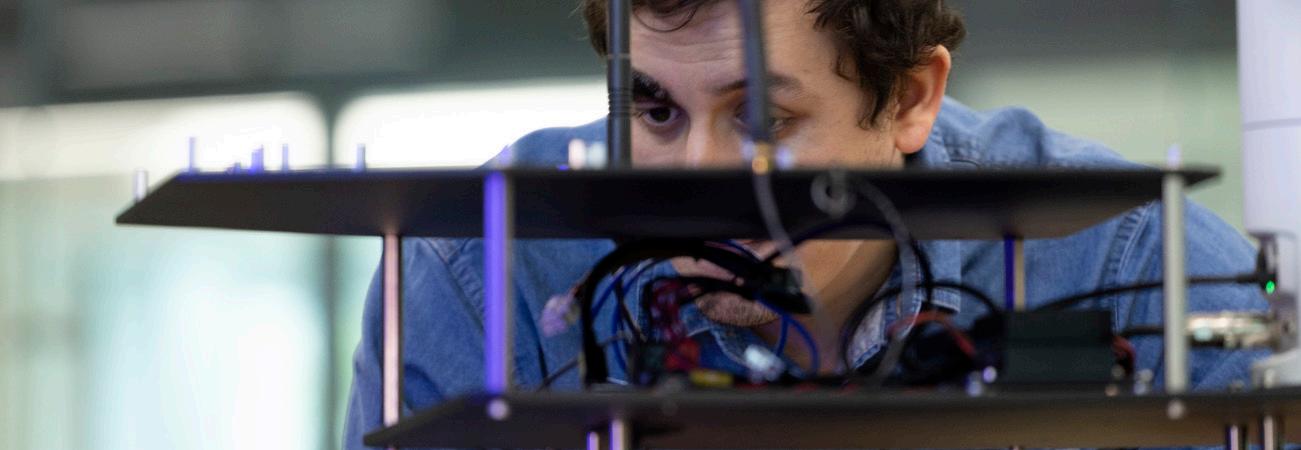ENGINEER

ENGINEER THE FUTURE







Dear friends and colleagues,
Welcome to the College of Engineering and Computer Science!
We are a dynamic college, filled with innovation and boundless opportunities. In the fields of engineering and computer science, our collective efforts have an extraordinary impact on society. The work we do directly influences the way we live and interact, contributing significantly to the betterment of the human condition.
Here are some highlights of our recent efforts over the past 5 years:
• Top 3 fastest-rising Engineering Colleges in the U.S., 2020-22, U.S. News & World Report UG Rankings—current ranking #103
• #99 among public institutions, 2024 U.S. News & World Report Graduate Rankings (ranked for the first time in College history)
• 190% growth in external research funding
• 171% growth in graduate student enrollment (Computer Science)
• 545% growth in student internships
• $6.8M in research training grants in Cybersecurity, AI, and Data Science (NSF Cybercorps, S-STEM/AI, NSF/NRT, respectively)
• NSF Engineering Research Center (ERC) Smart Streetscapes (CS3), partners: Columbia (lead), Rutgers, UCF, Lehman College
• Pioneered the first Master’s degree program in AI in Florida
Our College of Engineering and Computer Science is at the forefront of multidisciplinary initiatives, having recently received a substantial gift from Florida Power and Light (FPL) to establish a center for smart energy technologies. This center fosters cross-disciplinary collaboration among faculty from various departments. Additionally, successful centers such as the Center for Connected Autonomy and Artificial Intelligence and the I-SENSE Research Pillar, the Freight Mobility Research Institute, NSF Industry/University Cooperative Research Center, Center for Advanced Knowledge Enablement (CAKE), the Center for Smart Health, the Fab Lab and the SeaTech Institute, showcase our commitment to diverse and impactful research.
At Florida Atlantic University’s College of Engineering and Computer Science, research isn’t just a facet of who we are, it’s a driving force that propels the institution forward. We strive to continue engineering a future where innovation and research converge to create solutions that address the challenges of our time.
Sincerely,
Spring 2024
DEAN
Stella Batalama sbatalama@fau.edu | 561.297.0136
DIRECTOR
Debbi Johnson-Rais djohnsonrais@fau.edu | 561.297.3426
DESIGN
Adlai Moss amoss1@fau.edu | 561.297.1399
WRITERS
Gisele Galoustian / Debbi JohnsonRais / Tatyana Dames / Lucia Forte
EDITORS
Kristen Fairgrieve / Debbi Johnson-Rais / Adlai Moss
PHOTOGRAPHY
Alex Dulce / Lucia Forte / DeAndre Cranston / Adlai Moss
ADDRESS
Florida Atlantic University College of Engineering and Computer Science
777 Glades Road EE 308 Boca Raton, FL 33431-0991 eng.fau.edu
MISSION STATEMENT
FAU’s College of Engineering and Computer Science is dedicated to shaping the future through cuttingedge research and transformative education. Internationally recognized for our expertise in Computer Science and Artificial Intelligence, Biomedical Engineering, Computer Engineering, Electrical Engineering, Civil, Environmental and Geomatics Engineering, Mechanical Engineering, and Ocean Engineering, we stand as pioneers in technology advancements.
Copyright © 2024 College of Engineering and Computer Science, Florida Atlantic University. Brief excerpts of articles in this publication may be reprinted without a request for permission if FAU Engineering & Computer Science is acknowledged in print as the source. For more information visit eng.fau.edu, or email info@eng.fau.edu
Stella Batalama Dean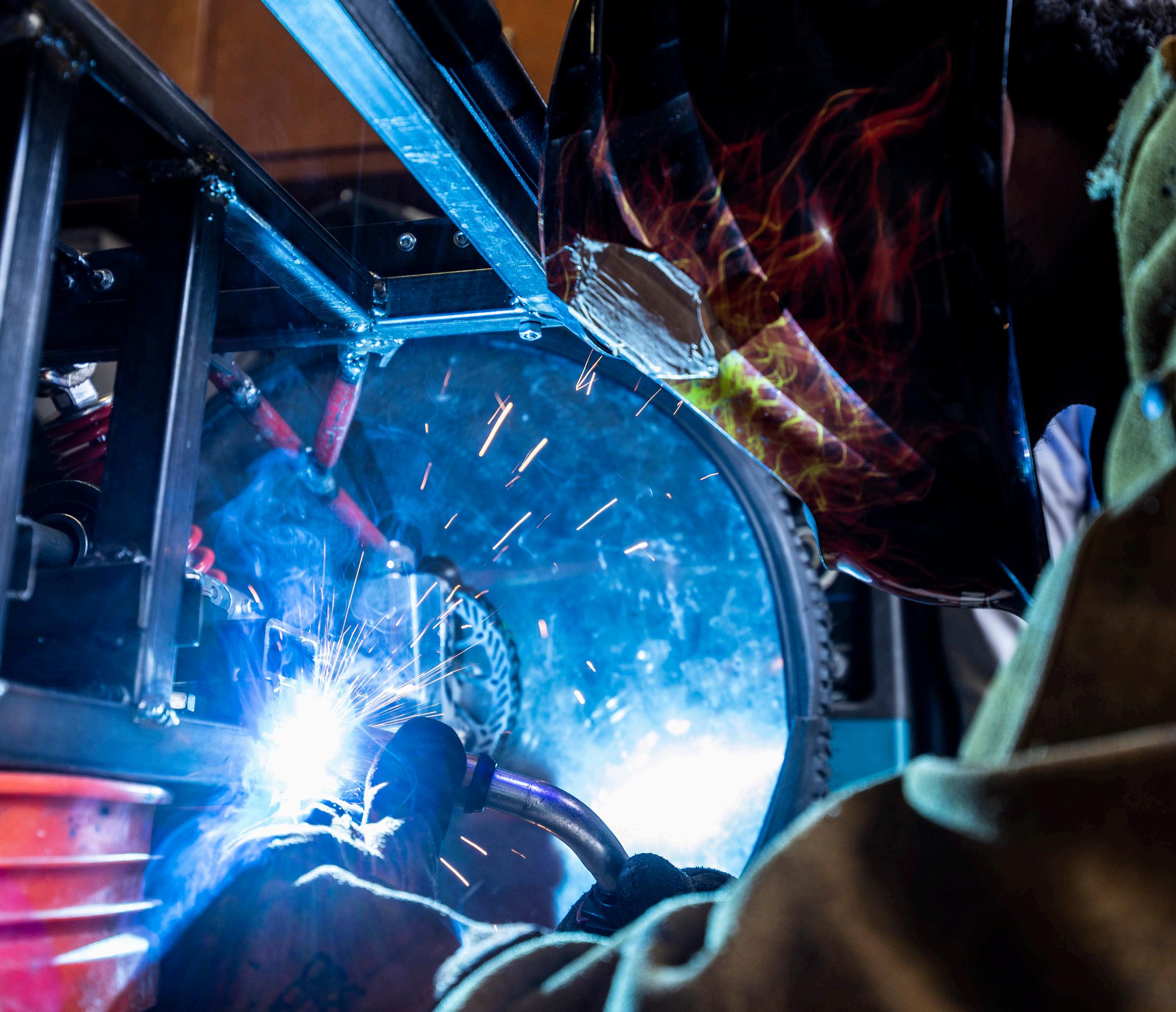
How She Engineers
Relearn

The College of Engineering and Computer Science of Florida Atlantic University received a $2.6 million grant from the National Science Foundation (NSF) to establish a scholarship program in the burgeoning and critical field of cybersecurity. The NSF’s CyberCorps® Scholarship for Service program seeks to increase the number of qualified cybersecurity professionals working for federal, state, local, territorial and tribal governments.
The program is managed by the NSF in collaboration with the United States Office of Personnel Management and the U.S. Department of Homeland Security. FAU is one of only six universities to receive the NSF CyberCorps award this year.
Designed to increase the volume and strength of the nation’s cybersecurity workforce, the program provides full scholarships and stipends to students pursuing studies at the intersection of cybersecurity and AI.
“This dynamic program will help to address an immense shortage of highly trained experts in the field of cybersecurity,” said Hari Kalva, Ph.D., principal investigator, interim chair and professor, FAU Department of Electrical Engineering and Computer Science within the College of Engineering and Computer Science. “We have a longstanding commitment to our students as well as robust course offerings related to cybersecurity to make this program a success. We are excited to contribute
in developing a highly skilled cybersecurity workforce to address the needs of our nation and state.”
The FAU project team has developed an integrated cybersecurity workforce development model that combines foundational preparation through coursework, deeper skill development with cutting-edge research, practical experience with internships, and integrated professional development. Activities for professional development, including certifications, will be integrated into the program to prepare scholarship recipients for a cybersecurity career in the federal government. This project further leverages the deep faculty expertise and course offerings to drive student training and skill development at the intersection of cybersecurity and thematic areas of AI, post-quantum cryptography, and hardware security.
Students will gain a broad understanding of cybersecurity opportunities in the federal government and will be trained to compete and secure jobs in the federal government.
$3.4M in Cybersecurity research training grants State of Florida; NSF $3.4M in AI and Data Science research training grants NSF/S-STEM; NSF/NRT
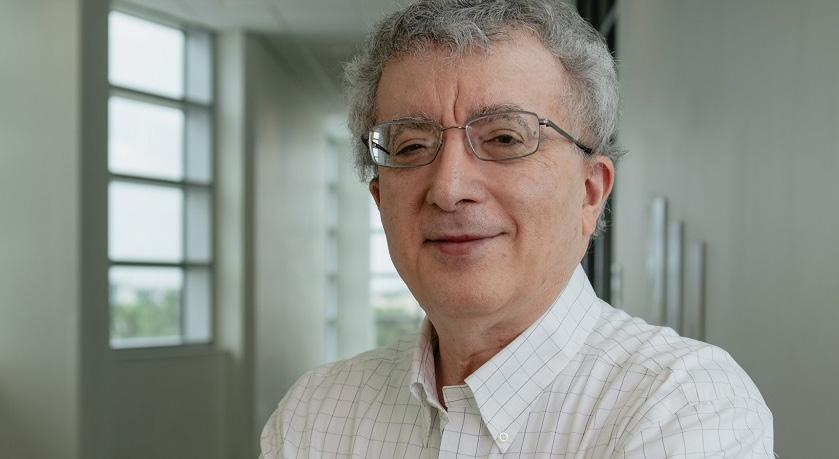
New research from the College of Engineering and Computer Science at Florida Atlantic University addresses this challenge by pinpointing fraudulent activity in the “vast sea” of big Medicare data. Since identification of fraud is the first step in stopping it, this novel technique could conserve substantial resources for the Medicare system.
“The performance of a classifier or algorithm can be swayed by multiple effects,” said Taghi Khoshgoftaar, Ph.D., Motorola Professor, FAU Department of Electrical Engineering and Computer Science within the College of Engineering and Computer Science. “Two factors that can make data more difficult to classify are dimensionality and class imbalance. Class imbalance in labeled data happens when most instances in the dataset have one particular label. This imbalance presents obstacles, as it is possible for a classifier optimized for a metric such as accuracy, which will mislabel fraudulent activities as non-fraudulent to boost overall scores in terms of the metric.”

Identifying the underlying cause of extreme events such as floods, heavy downpours or tornados is immensely difficult and can take a concerted effort by scientists over several decades to arrive at feasible physical explanations.
Extreme events cause significant deviation from expected behavior and can dictate the overall outcome for a number of scientific problems and practical situations. For example, practical scenarios where a fundamental understanding of extreme events can be of vital importance include rogue waves in the ocean that could endanger ships and offshore structures or increasingly frequent “1,000-year rains,” such as the life-threatening deluge in April that deposited 20 inches of rainfall within a seven-hour period in the Fort Lauderdale area.
Researchers from Florida Atlantic University’s College of Engineering and Computer Science leveraged a computervision deep learning technique and adapted it for nonlinear analysis of extreme events in wall-bounded turbulent flows, which are pervasive in numerous physics and engineering applications and impact wind and hydrokinetic energy, among others. The study focused on recognizing and regulating organized structures within wallbounded turbulent flows using a variety of machine learning techniques to overcome the non-linear nature of this phenomenon. Results published in the journal Physical Review Fluids, demonstrate that the technique the researchers employed can be invaluable for accurately identifying the sources of extreme events in a completely data-driven manner. The framework they formulated is sufficiently general to be extendable to other scientific domains, where the underlying spatial dynamics governing the evolution of critical phenomena may not be known beforehand.

For people who have suffered neurotrauma such as a stroke, everyday tasks can be extremely challenging because of decreased coordination and strength in one or both upper limbs. These problems have spurred the development of robotic devices to help enhance their abilities. However, the rigid nature of these assistive devices can be problematic, especially for more complex tasks like playing a musical instrument.
A first-of-its-kind robotic glove is lending a “hand” and providing hope to piano players who have suffered a disabling stroke. Developed by researchers from Florida Atlantic University’s College of Engineering and Computer Science, the soft robotic hand exoskeleton uses artificial intelligence to improve hand dexterity.
Combining flexible tactile sensors, soft actuators and AI, this robotic glove is the first to “feel” the difference between correct and incorrect versions of the same song and to combine these features into a single hand exoskeleton.
“Playing the piano requires complex and highly skilled movements, and relearning tasks involves the restoration and retraining of specific movements or skills,” said Erik Engeberg, Ph.D., Professor in FAU’s Department of Ocean and Mechanical Engineering within the College of Engineering and
Computer Science, and a member of the FAU Center for Complex Systems and Brain Sciences and the FAU Stiles-Nicholson Brain Institute. “Our robotic glove is composed of soft, flexible materials and sensors that provide gentle support and assistance to individuals to relearn and regain their motor abilities.”
Clinicians could use the data to develop personalized action plans to pinpoint patient weaknesses, which may present themselves as sections of the song that are consistently played erroneously and can be used to determine which motor functions require improvement. As patients progress, more challenging songs could be prescribed by the rehabilitation team in a game-like progression to provide a customizable path to improvement.

In the latest U.S. News & World Report, the College of Engineering and Computer Science of Florida Atlantic University is ranked #103 among public universities, its highest ranking ever. FAU Engineering is an engine for success for the whole FAU, now ranked #112 among public universities in undergraduate programs.
Two years ago, the FAU College of Engineering and Computer Science was in the top 3 fastest rising engineering colleges in the nation for the period 2020-22 (U.S. News & World Report Undergraduate Rankings) and was ranked #111, a 23-position jump up from the previous year. In Spring 2023, the College of Engineering and Computer Science was ranked by U.S. News & World Report Graduate Rankings for the first time in its history, reaching #99 among public institutions.
The FAU College of Engineering and Computer Science continues its steep upward trajectory with state-of-the-art research and innovation, strong industry partnerships, and one-of-akind student-centered workforce development programs

In the United States, sickle cell disease affects about 100,000 people, and about 2 million Americans carry this genetic

mutation. The most common and serious problems caused by sickle cell disease are anemia, and pain and organ failure. Stroke affects about 10 out of 100 children who have this disease. The national median life expectancy for people who have sickle cell disease can reach up to age 50.
The main goal of managing sickle cell disease is preventing these acute, painful crises. To do so requires diagnostic and monitoring tools under a physician’s supervision. However, current tools are bulky, expensive and require technical training. Moreover, the gold standards used to monitor and diagnose sickle cell disease rely primarily on genetic tests and optical microscopy of sickleshaped red blood cells, which are time-consuming, cause delays and do not capture changes in real time.
Using microfluidics, flow cytometry and electrical impedance, Sarah Du, Ph.D., and associate professor in Florida Atlantic University’s Department of Ocean and Mechanical Engineering within the College of Engineering and Computer Science, recently received a patent from the United States Patent and Trademark Office for a novel invention that will offer patients a better way to manage their disease.
The device developed by Du rapidly and reliably monitors
sickle cell disease continuously using a microfluidics-based electrical impedance sensor, which can characterize the rate of cell sickling and the percentage of sickled cells. It can distinguish the dynamic cell sickling and unsickling processes in sickle blood without the use of microscopic imaging or biochemical markers.
Assisted with a computer application developed for the device, users can perform impedance scans over designated lengths of time, graph the measured magnitude and phase of the impedance measured, and share the raw data directly from a smartphone. The portable device, which weighs about 1 pound, can be handheld and is easy to operate.
“The combination of electrical impedance measurements and microfluidics provides a promising method to rapidly assess the dynamic processes of cell sickling and unsickling in patients with sickle cell disease,” said Stella Batalama, Ph.D., dean, FAU College of Engineering and Computer Science. “Professor Du’s cuttingedge technology, which has received an important U.S. patent, will provide patients with sickle cell disease opportunities to reliably and conveniently monitor their disease in the same way patients with diabetes can monitor their disease using a glucometer.”
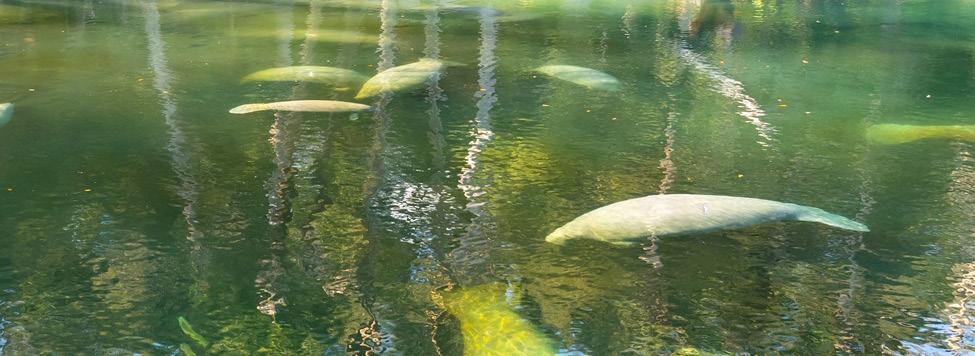
Manatees are endangered species volatile to the environment. Because of their voracious appetites, they often spend up to eight hours a day grazing for food within shallow waters, making them vulnerable to environmental changes and other risks.
Accurately counting manatee aggregations within a region is not only biologically meaningful for observing their habit, but also crucial for designing safety rules for boaters and divers as well as scheduling nursing, intervention, and other plans. Nevertheless, counting manatees is challenging.
Because manatees tend to live in herds, they often block each other when viewed from the surface. As a result, small manatees are likely to be partially or completely blocked from view. In addition, water reflections tend to make manatees invisible, and they also can be mistaken for other objects such as rocks and branches.
While aerial survey data are used in some regions to count manatees, this method is timeconsuming and costly, and the accuracy depends on factors such as observer bias, weather conditions and time of day. Moreover, it is crucial to have a low-cost method that provides a real-time count to alert ecologists of threats early to enable them to act proactively to protect manatees.
Artificial intelligence is used in a
wide spectrum of fields, and now, researchers from Florida Atlantic University’s College of Engineering and Computer Science, among them Professor Xingquan (Hill) Zhu, IEEE Fellow, have harnessed its powers to help save the beloved manatee. They are among the first to use a deep learningbased crowd counting approach to automatically count the number of manatees in a designated region, using images captured from CCTV cameras, which are readily available, as input.
This pioneering study, published in Scientific Reports, not only addresses the technical challenges of counting in complex outdoor environments but also offers potential ways to aid endangered species.
To determine manatee densities and calculate their numbers, researchers used generic images captured from surveillance videos from the water surface. They then used a unique design matching to manatees’ shape – Anisotropic Gaussian Kernel (AGK) – to transform the images into manatee customized density maps, representing manatees’ unique body shapes.
Although many methods exist for counting, most of the existing counting methods are applied to crowds to count the number of people, due to their relevance to important applications such as urban planning and public safety.
To save labeling costs, researchers used linelabel based annotation with a single straight line to mark each manatee. The goal of the study was to learn to count the number of objects within a scene and obtain labels to support counting.

• Artificial Intelligence
• Biomedical Engineering
• Civil Engineering¹
• Computer Engineering
• Computer Science
• Cyber Security
• Data Science and Analytics
• Electrical Engineering
• Environmental Engineering
• Geomatics Engineering
• Information Technology & Management
• Mechanical Engineering
• Ocean Engineering
• Transportation Engineering
FPL Center for Intelligent Energy Technologies
Center for Connected Autonomy and AI
I-SENSE University-wide Engineering Institute
Center for SMART Health
USDOT / Freight Mobility Research Institute
NSF / ERC: Center for Smart Streetscapes (CS3)
NSF / IUCRC - CAKE
Gangal Innovation Hall and Fab Lab

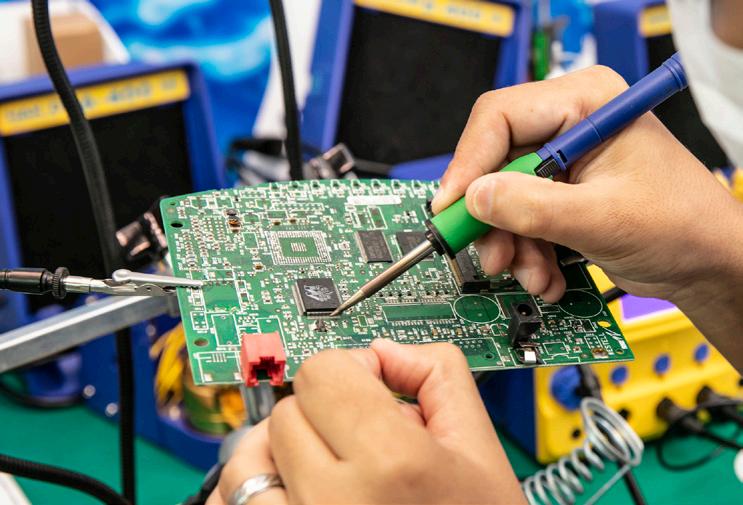



FAU’s collaboration with Engineers in Action (EIA) since 2020 has solidified its leadership in bridge construction through the collaborative Bridge Program, resulting in the erection of three bridges and positioning the university as a pioneer in providing crucial infrastructure to rural communities. This partnership emphasizes FAU’s commitment to sustainable development and global engagement, offering students invaluable practical experience while serving underserved communities.
The recent completion of the Emlaleni Mabovini footbridge by FAU civil engineering students is a significant milestone, connecting the Mkhulamini community to vital services and commercial centers. Spearheaded by senior civil engineering student Emmanuel Francois, the project underscores the transformative power of engineering in addressing real-world challenges and fostering economic growth.
The involvement of alumni like Alexander Hintze and Carolina Velez showcases the enduring impact of FAU’s bridge-building initiatives, reflecting FAU’s mission to instill adaptability, leadership, and global citizenship in its students. Looking ahead, FAU remains committed to expanding its bridge-building efforts, demonstrating its dedication to creating positive change through education and community engagement under the guidance of Frederick Bloetscher, Ph.D., associate dean for Undergraduate Studies and Community Outreach in the Department of Civil, Environmental and Geomatics Engineering within the College of Engineering and Computer Science.

Researchers and students from Florida Atlantic University’s College of Engineering and Computer Science are part of a local effort to create a new educational marine park and restore the natural habitat along the Hillsboro Inlet in Pompano Beach. The Wahoo Bay project has been made possible by a one-year grant from Shipwreck Park, a not-for-profit organization.
“Wahoo Bay has been designed to be a living laboratory that will provide an immersive experience for visitors while raising awareness of keeping our oceans and coral reef systems healthy,” said Stella Batalama, Ph.D., dean, College of Engineering and Computer Science. “We are excited to collaborate with Shipwreck Park and an impressive team of experts, scientists and citizens who share the same passion and mission for conservation, education and community outreach.”
Within this interactive park, visitors of all ages can explore the educational space above or below the water, or virtually, to learn about what types of marine and plant life thrive in our oceans and reefs and the importance of keeping these habitats healthy.
The in-water experience will be made accessible for all ages and abilities, while the on-shore experience will provide guests with interactive educational and
public art exhibits.
Researchers from FAU’s Center for Connected Autonomy and Artificial Intelligence (CA-AI) and the Institute for Sensing and Embedded Network Systems Engineering (I-SENSE) are spearheading the installation of a water monitoring system while the National Oceanic Atmospheric Administration (NOAA) weather station collects historical data. In addition to automated monitoring stations, a self-cleaning 360-degree underwater camera that provides 4K livestream video and audio 24/7 will be installed.


Professor Erik Engeberg, in the Department of Ocean and Mechanical Engineering at FAU, is breaking new grounds with his state-of-the-art research in soft robotics applied to prosthetic arms and hands. He recently published a research article on a soft robotic exoskeleton designed to assist piano playing after injury or stroke, which went viral with an Altmetric score of 1,607. This research was prominently featured on the National Science Foundation website, and on the National Institute of Biomedical Imaging and Bioengineering website. He is currently developing an AIpowered autonomous muscle training program to enable upper limb amputees to maximize their capability for dexterous control of artificial hands. His research will have a tremendous impact on the lives of many people with a missing arm.


Professor Pados and his team at the Center for Connected Autonomy and AI conduct research that focuses on creating the future of Networked-AI and Connected Autonomous Systems (in the oceans, ground, air, space) supported by 1) Autonomous resilient and secure machine-to-machine communications; 2) robust team (multi-agent) AI training; 3) real-time operational stage monitoring, all executed on software-defined continuously self-optimizing joint radio/computing platforms. Selected ongoing projects at FAU CA-AI include the development of: a first-of-its-kind testbed for connected AI robotics; ocean IoT infrastructure for coastal monitoring, conservation, and education; connected
unmanned aerial systems for distributed synthetic aperture radar imaging; interference-avoiding and secure communications for swarm robotics; training dataset curation for learning in the presence of missing/faulty data.


Waseem Asghar
Associate Professor, Department of Electrical Engineering and Computer Science wasghar@fau.edu
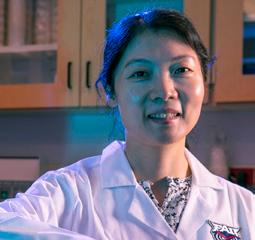
Sarah Du
Associate Professor, Department of Ocean and Mechanical Engineering edu@fau.edu
Living Devices and Biosensors
Micro and nanotechnology in medicine
Professor Waseem Asghar and his team focus their research on micro and nanotechnology and their applications in the diagnosis of infectious diseases, in vitro fertilization, and biomedical devices. Recent innovations include the development of biosensing platforms made of plastic film and cellulose paper to diagnose HIV and Corona Virus, the development of devices to detect Zika virus rapidly and inexpensively at airports and point-of-care settings, and use of smart phones for the detection of infectious agents. They are also developing point-of-care and microfluidic biosensors for rapid detection of diseases such as cancer and candidiasis, easy-to-use and inexpensive sperm sorting devices to be used in intrauterine insemination, intracytoplasmic sperm injections and IVF.

Professor Du and her team conduct research in microfluidics and biosensors for biomechanics and biophysics. Microfluidics provides a useful platform to interface with biological systems, where engineering and materials science can be integrated for replicating the microenvironment of cells while quantifying how they exert and respond to physical forces and biochemical cues. Professor Du’s team develops microfluidic chips and biosensors to study these processes and applies them for both fundamental biological and applied clinical research. Professor Du and her group recently received a patent from the U.S. Patent and Trademark Office for a device that will rapidly and reliably monitor sickle cell disease continuously, using a microfluidics-based sensor.

Ramin Pashaie
Professor and I-SENSE Fellow, Department of Electrical Engineering and Computer Science rpashaie@fau.edu
Professor Ramin Pashaie and his team conduct research in the areas of optics and biophotonics, electromagnetics, and their applications in neuroscience. His work is multidisciplinary in nature and is focused on developing technologies to help diagnose and treat brain and nervous system disease and injury. During the last few years, he and his team have specifically focused on understanding how neural networks and vascular networks in the brain are coupled. In some brain diseases such as Alzheimer’s, the coupling mechanism is disrupted, which
Professor Hari Kalva and his team conduct research in the areas of visual information processing that considers the entire video pipeline: capture, compression, communication, and consumption. The group’s work also addresses enabling and optimizing visual information processing targeting new modalities of presentation such as AR/VR. A key area of focus is visual information processing that targets machine consumption, contributing to ISO international standards development. With a computer vision system as the end consumer, the team re-imagines video representation and compression. The group’s recent work includes application of visual information processing to solve problems in healthcare, intelligent surveillance, and ecological conservation.
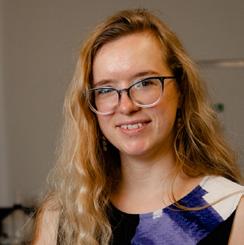
Vivian Merk
Assistant Professor, Department of Ocean and Mechanical Engineering vmerk@fau.edu
Professor Vivian Merk’s group focuses on improving our understanding of biological crystal growth in complex organic matrices using electro-optical methods, Raman microscopy, and synchrotronbased X-ray imaging. The team seeks to develop sustainable synthesis protocols that emulate mineralized structures in the biosphere. Recent publications include Synchrotron-based X-Ray Fluorescence Microscopy Mapping the Ionome of a Toxic Freshwater Cyanobacterium, and Multimodal Imaging of Nitrogen-fixing Cyanobacteria in the Near-Native State.
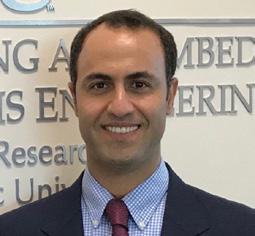
Reza Azarderakhsh
Professor and I-SENSE Fellow, Department of Electrical Engineering and Computer Science
razarderakhsh@fau.edu
Professor Reza Azarderakhsh and his research team specialize in modern cryptographic engineering, covering areas such as classical and postquantum cryptography, side-channel analysis, secure protocol design, and hardware/software implementations and integrations. Their primary focus lies in safeguarding the privacy of individuals, governmental entities, and industries in anticipation of the post-quantum era. Their objective is to pioneer cryptographic solutions that preemptively defend against potential breaches by quantum computers, ensuring robust security measures are in place before quantum-powered hacking becomes feasible.
can be the cause or a main symptom of the disease. Dr. Pashaie’s group has developed brain imaging and brain interface platforms and use the developed technology to understand how these two networks are coupled in the brain and how this mechanism is disrupted specifically in Alzheimer’s. Recent publications include The effect of micro-ECoG substrate footprint on the meningeal tissue response, and Monitoring cerebral hemodynamics following optogenetic stimulation via optical coherence tomography.
Their work aims to protect the privacy of individuals, governments, and industry in a post quantum world. The goal is to develop encryption that can’t be breached by a quantum computer proactively before quantum powered hacking becomes a reality.
Recent publications include SIKE in 32-bit ARM Professors Based on Redundant Number System for NIST Level-II, and Parallelism Strategies for the Tuneable Golden-Claw Finding Problem.
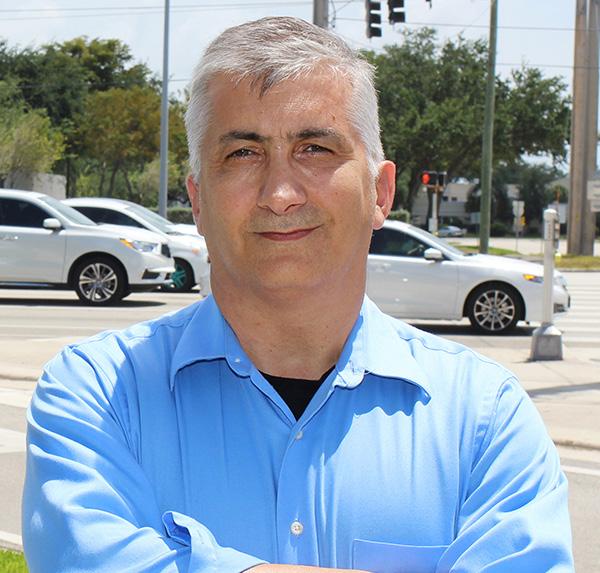
Evangelos Kaisar Chair and Professor, Department of Civil, Environmental and Geomatics Engineering ekaisar@fau.edu
Professor Evangelos I. Kaisar and his team carry out research in logistics and transportation system design, transportation system security and efficiency, resilience, and safety. Professor Kaisar is leading a consortium of experts at the Freight Mobility Research Institute (FMRI), a USDOT Tier 1 University Transportation Center sponsored by the U.S. Department of Transportation to increase resiliency and avoid key commodity shortages.
The FMRI has assembled top expertise on freight transportation, logistics, resilience, sustainability, and ITS, representing leading universities across the nation with deep connections to local, state, and regional communities. The Institute’s contribution focuses on promoting freight mobility, equity, and accessibility through information technology and cybersecurity, freight

Professor Jason Hallstrom and his team at the Institute for Sensing and Embedded Network Systems (I-SENSE) ) provide world-class expertise in sensing, computing, communications, artificial intelligence, and cybersecurity. In the context of Florida’s growing population, the Institute’s work helps meet the current and future needs of residents and business owners within cities and smaller municipalities by maximizing livability, safety, economic prosperity, and environmental sustainability. The team, spanning faculty and staff across the College of Engineering and Computer Science and beyond, was recently awarded the Engineering Research Center (ERC) for Smart

Professor Raquel Assis and her group develop computational and statistical approaches to address questions regarding evolution and disease from their genomic footprints. The team is currently designing novel machine learning methods for understanding the evolutionary and disease implications of different types of structural variations (SV’S) by determining how they modify gene expression, assessing their adaptive significance and probing their roles in normal and disease phenotypes. Recent
planning, environmental accountability, as well as supply chain sustainability and resilience. The Institute’s research, education, workforce development, and technology transfer advance local, state, and regional planning and foster transportation priorities that deliver higher practice and economic growth and enhance productivity. Recent projects include Modeling the Adoption, Distribution, and Utilization of Autonomous Delivery Robots and Delivery Lockers in the Aftermath of the COVID-19 Pandemic and Management of Supply Chain Disruption of Freight Network Using Advanced Algorithms.
Streetscapes (CS3) with partners from Columbia University, Lehman College, Rutgers University, and the University of Central Florida.
In addition, I-SENSE recently became the primary technology provider for the Southeast Atlantic Econet (SEA Econet), supporting a network of nearly 200 atmospheric monitoring stations and directly operating more than 105 in Florida. Nearly every weather forecast received by a Florida resident is made possible, in part, by the atmospheric monitoring network built and operated by the College of Engineering and Computer Science.
publications include Predicting Evolutionary Targets and Parameters of Gene Deletion from Expression Data, which shows that predicting the relative prevalence of redundant and unique functions among genes targeted by deletion, as well as parameters underlying their evolution, can shed light on the role of gene deletion in adaptation.

January 23, 2024
The EnergyTech University Prize (EnergyTech UP) offers $450,000 in cash prizes to student teams to present ideas for integrating emerging energy technologies into innovative business concepts.
In our program, winners are chosen based on the quality of the plan, not resumes, IP ownership, or prior funding, and teams can present plans for technology developed and available for license from national labs or tech developed by their institution. Teams must submit just a 200-word summary of the
technology to be leveraged and the business opportunity by February 1, 2024, and then we’ll assign teams to a regional Explore event and help them refine their ideas to prepare for a full pitch on February 27, 28, or 29.

April 24, 2024
Embark on a journey of innovation as we celebrate the brilliance of our Engineering and Computer Science graduates. Witness the unveiling of groundbreaking projects that address real-world challenges with revolutionary ideas.
Our spring showcase is more than just an exhibition; it’s a tribute to the next generation of innovators who are shaping the future of technology and engineering. Don’t miss the opportunity to be inspired by the incredible achievements of our talented students.
Responsible AI Hackathon

February 23-24, 2024
Technologies and solutions to enable Responsible AI are critical to the deployment and success of AI! Participate in this hackathon to learn, explore, and win prizes! A series of short workshops/talks by prominent experts will help you learn and fuel your creativity to propose tools/frameworks/solutions to enable reliable AI!
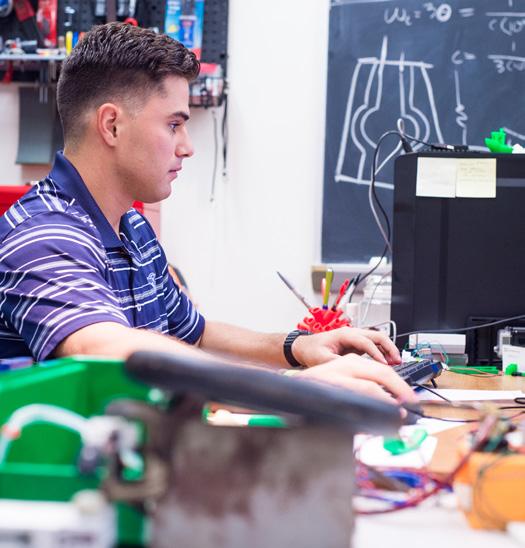
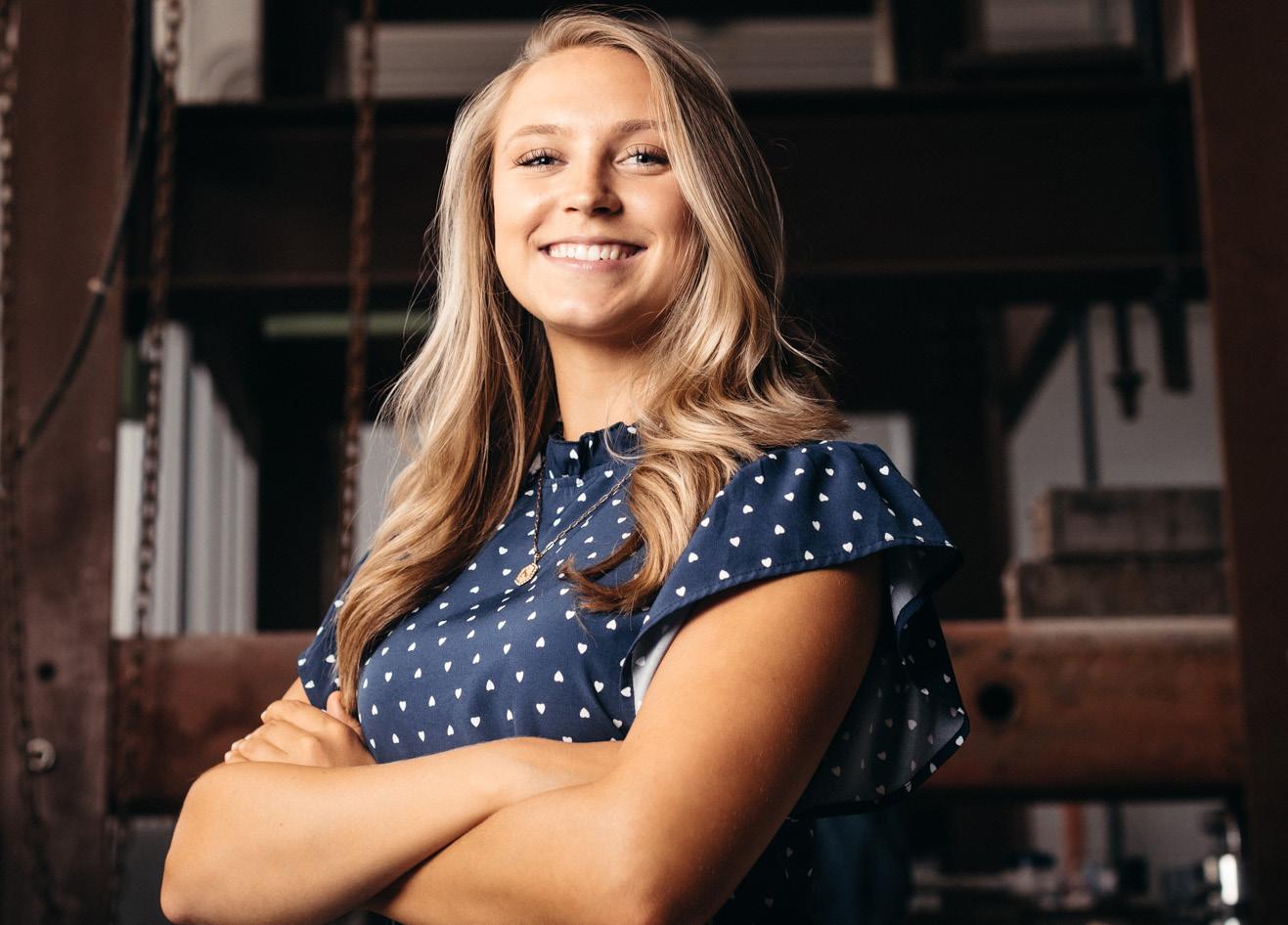
The Women in Engineering and Computer Science (WIECS) Student Organization provides a comprehensive support system that incorporates a Mentor Community component, professional development and leadership opportunities, academic support, and social activities tailored for the women students of the College. WIECS provides meaningful experiences that facilitate positive interpersonal relationships through a strong support system. This network helps students navigate the exciting but rigorous
engineering and computer science curriculum and prepares them to enter the profession.
The student Center for Women in Engineering and Computer Science, which is a space dedicated to the club, is open to all students in the College regardless of gender. It provides space for collaborative learning, mentorship and networking opportunities. Additionally, the various professional societies of women in Engineering such as Girls Who Code, Society of Women in Engineers, Alpha
Omega Epsilon and the Women’s Transportation Seminar host a variety of activities in the student Center. These include study hours, networking events with industry sponsors, K-12 engagement opportunities and social events. Several faculty-led workshops and panels that take place support students through academic and professional seminars on choosing graduate programs, leadership, wellness, and forming a supporting and connected community.

My college experience was like a snowball effect. I started off as a highschooler at FAU High taking the undergraduate required courses and ended up being the Florida Surveying and Mapping Society (FSMS) FAU Chapter president, passing the FS exam, and having the highest GPA in my graduating class by the time I graduated at 19.
Holding myself to such a high standard at a young age could be overwhelming, but it is also rewarding. I knew that I would be taking classes with no one my age or demographic, but in a way, this made me work harder. After a few successful semesters, my confidence was built up and I realized that I could take on more roles. In the spring 2022 semester, I started my internship at Avirom & Associates as a CADD technician. This opportunity gave me hands-on experience with the field of land surveying, especially using CADD software and creating deliverables. In the fall 2022 semester, I held the secretary role of the FSMS FAU Chapter. In the spring 2023 semester, I participated in undergraduate research under Dr. Madasamy Arockiasamy for the “Maa Experiential Learning Opportunities for South Florida Underserved High School Students” NASA funded project. My role in this project included researching topics related to hydrology and acoustic damping and creating presentations for teachers to deliver to their high
school students. By fall 2023, I was the president of the FSMS FAU chapter, inviting guest speakers and organizing networking events.
This confidence continued through to my FS exam preparation. I watched review videos provided by Dr. Hongbo Su and Dr. Sudhagar Nagarajan and looked over notes I had taken from classes in previous semesters. In the end, passing the FS exam reassured me that hard work and discipline always pays off.
Having to pick the degree I would pursue at 15 years old was definitely an intimidating decision. Looking back at it, I am proud of myself for choosing geomatics engineering here at FAU. Being the first and only FAU High student to complete this degree, I hope more young students decide to be a part of this program. I would like to thank Dr. Hongbo Su and Dr. Sudhagar Nagarajan for giving me several opportunities to better myself academically and to increase my participation within the university and the geomatics profession.
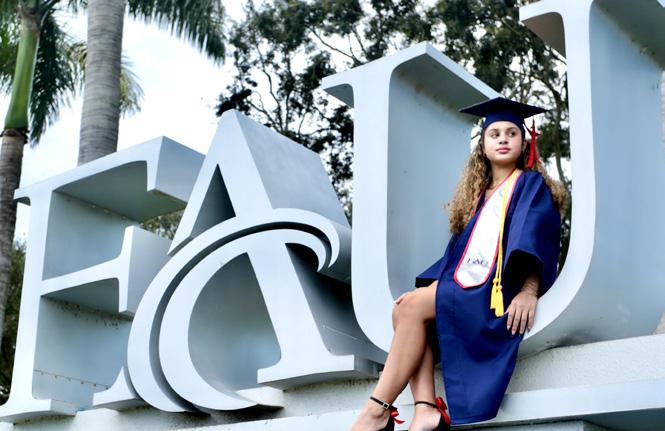



From the engineering floor to the final four! Join the winning team and engineer your future with Florida Atlantic.
Owls Racing soaring high on the screens of Times Square, proudly sharing the spotlight with the world’s most iconic skyline!
Welcome
Our Welcome Back BBQ celebrates the start of each semester and sets the tone for a semester filled with camaraderie as we embark on this exciting academic journey together!


Focus on things that are directly under your control, like the effort and energy you put into your education and professional work. Be open to exploring new opportunities that come your way at an early stage in your career without being too concerned about the outcome. Working on challenges in a high-trust environment, with mentors and peers that show you how to consistently persevere,

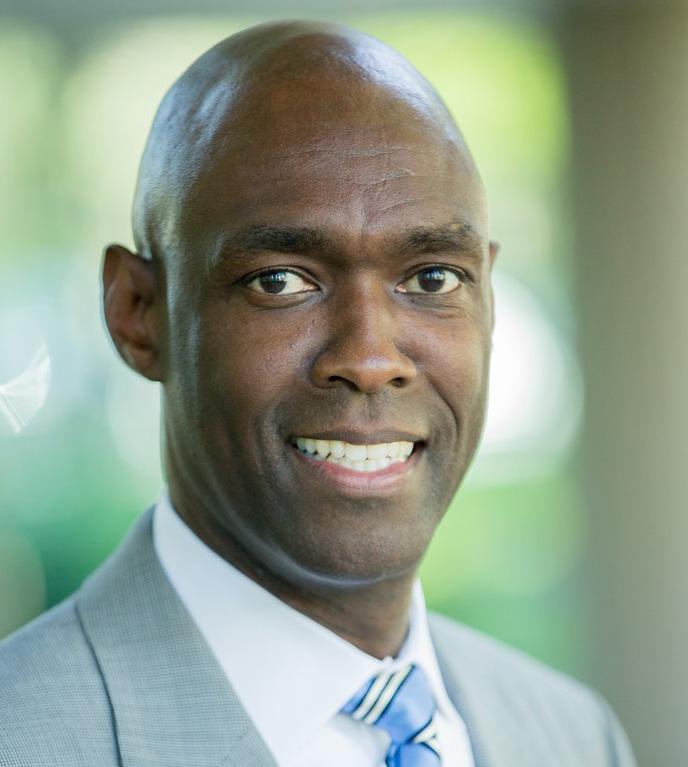
Dear friends,
Invest in FAU College of Engineering and Computer Science. As the Director of Development for the College of Engineering & Computer Science at Florida Atlantic University, I want to emphasize the significant impact your support can have on our institution and the students we aim to empower.
Our College is a hub of innovation and education, where cutting-edge research meets hands-on learning. Your generous donation will contribute to key areas:
1. Student Scholarships: Your support benefits bright students pursuing engineering and computer science, removing financial barriers.
2. Research Advancements: Your donation fuels groundbreaking research and supports faculty projects that drive innovation.
3. State-of-the-Art Facilities: Your contribution helps us maintain and enhance labs, classrooms, and collaborative spaces to foster creativity.
4. Industry Partnerships: Your support strengthens ties with leading companies, providing students real-world experiences and career opportunities.
5. Community Outreach: Your donation promotes STEM education in the community, inspiring future generations.

Investing in the future of technology and innovation at Florida Atlantic University, College of Engineering and Computer Science, together, we shape the future.
Thank you for considering this opportunity to make a difference.
Warm regards,
Michael O. Miller
Director of Development
College of Engineering & Computer Science
Florida Atlantic University
Desk: 561-297-2083 Cell: 805-448-5430
E-mail: millermichael@fau.edu
Florida Atlantic University
777 Glades Road EE 308
Boca Raton, FL 33431-0991
